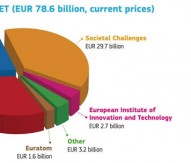

© Department for Business, Innovation & Skills
UK on the Horizon in 2020
The European Commission hopes each member state will gain significantly from Horizon 2020, through both liquidity finance and the number of research projects awarded funding. The UK benefitted considerably from FP7 and hopes for repeat results under Horizon 2020. David Willetts was appointed as the UK Minister for Universities and Science in May 2010 and outlined his thoughts to PEN on how the UK could exploit the most from the EU’s next research and innovation framework programme.
How do you believe the UK can best take advantage of Horizon 2020?
The UK is already a leading player in European funding programmes for research and innovation. Indeed, our universities, research institutes and businesses participate in more projects in FP7 than any other member state and are second only to Germany in terms of cash receipts. The UK is also the top destination in Europe for European Research Council grant holders, a testament to the excellence of our universities, for whom the EU programmes are an increasing source of revenue.
Horizon 2020 will build upon these strong foundations, providing support from frontier research through to proof of concept. In the coming months, the Department for Business, Innovation and Skills and our partners, notably the Technology Strategy Board and the research councils, will be working hard to support UK bidders to Horizon 2020. I hope that the simpler administrative processes for participants, which form a central role in the Horizon 2020 legislative negotiations, will provide greater incentive for businesses, including SMEs, to take part.
In your opinion, what impact will the European Council’s proposed budget cut have on Horizon 2020?
The outcome of the Multiannual Financial Framework (MFF) negotiations was very good for research and innovation. Heading 1A, which covers Horizon 2020 and other pro-growth investment, will now account for 13% rather than 9% of the total budget. This is an increase of 37% compared to the last MFF. The specific budget for Horizon 2020 has yet to be finalised and the overall MFF agreement requires the consent of the European Parliament. The agreement reached at the Council states that funding for Horizon 2020 will represent a real growth compared to 2013 level. Overall, this is a better-framed budget in terms of growth, jobs and competitiveness and there is now a real need to ensure that the Parliament supports the overall deal.
What barriers could participants face that could affect the final results of the Horizon 2020?
While Horizon 2020 is a key element of the EU growth agenda, the money spent on these programmes risks being wasted if innovation is choked off by inadequate or inappropriate regulatory regimes at national or European level. Regulatory barriers to the development and exploitation of new technologies could lead to a loss in Europe’s competitiveness in the international arena, especially when compared to countries like the USA, Japan and South Korea. An example of this is the lack of a suitable regulatory framework for the operation of commercial space vehicles.
Another closely related problem is an over-vigilant application of the precautionary principle, formulating regulation in a way that does not take full account of scientific evidence. Regulating the use of nanomaterials is an example where formulation of regulation has not been backed up by scientific analysis of risk. The European Commission has appointed Professor Anne Glover as its chief scientific adviser, an indication that it is taking a first step for more scientific input into policy making. I have already made my concerns on this topic clear to Commissioner Geoghegan-Quinn and to my ministerial colleagues and will continue to do so.
What benefit do you feel the proposed Knowledge Innovation Centres can bring to the UK?
Participation in the European Institute of Innovation and Technology (EIT) Knowledge and Innovation Communities (KICs) can help increase the UK’s innovation capacity and boost its ability to commercialise knowledge. The KICs have a unique ability to join up innovation, research and higher education. EIT funding can play an important role in fostering a new generation of entrepreneurs, supporting the creation of innovative enterprises and providing them with a large network of potential partners and end users across the EU.
How do you think the UK can ensure its research priorities coincide with those of the wider EU research community?
The UK’s research base forms an important part of the wider EU research community and our research funding agencies have strong links with their counterparts elsewhere in the EU, so one would expect there to be some degree of convergence on priorities. In general terms, Horizon 2020′s focus on research aimed at addressing the shared grand challenges facing Europe – and indeed the world – should help to ensure that it remains in line with the priorities established at member state level. Our research councils will naturally be very attentive to priorities established at EU level. This is, however, a two-way street – it is important to ensure that we and other member states have effective input into the processes by which work programmes in Horizon 2020 are established and we are actively working to ensure that the governance structures established for Horizon 2020 will allow this to happen.
How would you define success for the UK within Horizon 2020?
A successful Horizon 2020 for the UK will mean a high level of participation from a wide range of research actors – universities, large businesses and SMEs. It will fund excellent science as well as support greater mobility of researchers between member states. A further Nobel Prize or two for ERC grant holders working in UK institutions would of course be an excellent achievement. There will however also be visible examples of Horizon 2020 helping to translate excellent research into high quality innovative goods, services and technologies to support growth across Europe. Horizon 2020 will also fund research which enables government to address major societal challenges with more effective and better informed policy initiatives. Finally, we must not forget the vital role that research in the social sciences and humanities can play in this field – a successful Horizon 2020 would fully integrate the insights which they can bring into all types of research.
David Willetts





